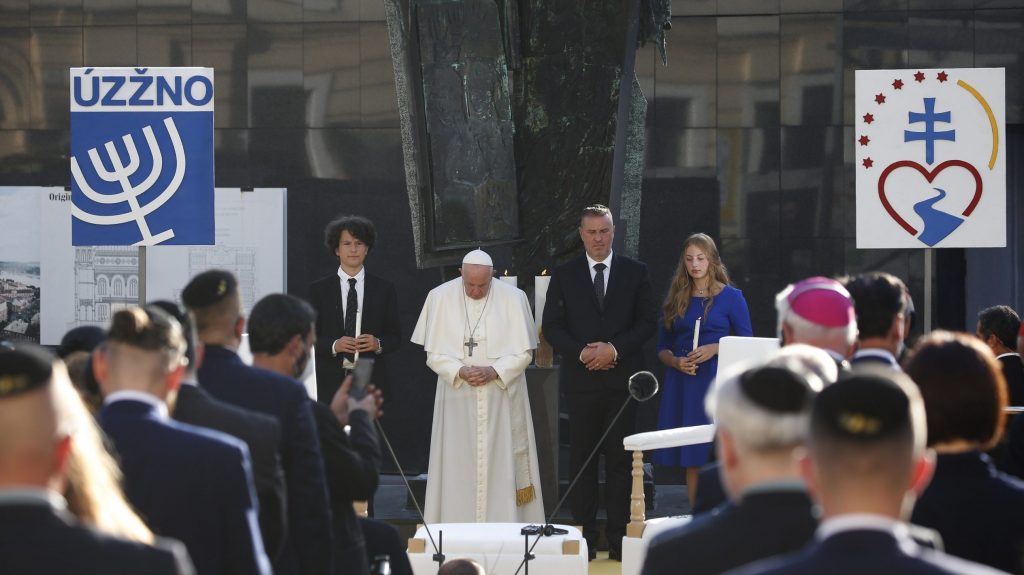Speaking in the place that was once the beating heart of Slovakia’s Jewish quarter, Pope Francis asked for Jews and Christians to work together so that the past is not forgotten, and religion doesn’t become irrelevant.
“Your history is our history, your sufferings are our sufferings,” said the pontiff, visibly moved by the witness shared by a survivor of the Holocaust.
Professor Tomáš Lang, who was born in 1942, said his generation survived “because they found themselves brave men who did not capitulate before evil and, risking their own lives, hid there until liberation.”
“It is an extraordinary honor for me to speak to you on the occasion of your precious visit to our country; to speak as a survivor of the Shoah. As a member of a generation that did not know their grandparents and do not even remember their parents. They died among the six million,” Lang said.
The encounter was held in the Rybné Námestie Square, in the heart of Bratislava. Until 1969, it was the site of the Neolog Synagogue, built in 1893. The building was destroyed to make way for the Bridge of the National Slovak Insurrection, or New Bridge.
The synagogue was right next to the Cathedral of St. Martin, which is still standing.
As Francis noted during his speech, the architectural setting was an expression of the peaceful coexistence of the two communities, an unusual symbol in the late 19th century.
Yet, during WWII, the pontiff said, “God’s name was dishonored” and in “a frenzy of hatred,” more than a hundred thousand Slovak Jews were killed and in an effort to eradicate every trace of the community.
Today, the square holds a public memorial that includes a black wall that holds a reproduction of the synagogue, and a 16-foot-tall sculpture topped with a Star of David.
Ursuline Sister Samuela, whose congregation hid Jews during the war, also addressed the event.
“We experience sincere pride, but also gratitude for every Slovakian who opened their door and their heart to their sisters and brothers and to friends to their persecuted Jewish brothers and sisters,” she said.
During his remarks, Francis said the name of God was “dishonored” by the events of the Holocaust.
“Here, reflecting on the history of the Jewish people marked by this tragic affront to the Most High, we admit with shame how often his ineffable Name has been used for unspeakable acts of inhumanity,” he said.
“How many oppressors have said: ‘God is with us’, yet it was they who were not with God!”
The pontiff urged Christians and Jews to work together so that the “empty and false idols” of power and money don’t prevail over human dignity, since this leads to a spirit of indifference and to forms of manipulation that would “exploit religion in the service of power or else reduce it to irrelevance.”
Forgetting the past opens the door to “ignorance” that justifies anything, including anger and hatred.
“I repeat: Let us unite in condemning all violence and every form of anti-Semitism, and in working to ensure that God’s image, present in the humanity he created, will never be profaned,” Francis said.
Slovak officials collaborated with the Nazis in the persecution of the Jews, which is still an open wound in the country.
During the decades of communism, anti-Semitism remained latent in the country and those Jews who had survived the war faced numerous difficulties in regaining their property. The communist regime censored discussion of the Holocaust, and even today some political parties deny the Slovak government’s complicity.
Today just under 2,000 Jews live in Slovakia, most of them in the country’s capital, Bratislava.
Last Wednesday the Slovak government apologized for the war-era Jewish Code that stripped the country’s Jews of their human and civil rights, with a statement acknowledging “a moral obligation to publicly express sorrow for the crimes committed by the past regime.”
Before heading to his encounter with the Jewish community, he had paid a private visit to the Bethlehem Center in Bratislava, which is run by the Missionaries of Charities.
The house provides shelter to homeless people, and at any given moment there are 20 to 40 residents. It is in the crime ridden Petržalka district, and the sisters have been there since 1997.
Father Vittek Juraj, the parish priest, told reporters that Francis chose this place within a list of possibilities when it came to the “peripheries” of Bratislava.
“The pope tries to look for the peripheries of the world and bring attention to them. Most of those living in this neighborhood, once known as the Bronx of Slovakia, don’t even know this house is here. Now they will!”
The poor, he said, are not just people who want material aid.
“They want love, friendship, someone who is interested in them. And I believe this is what Pope Francis wants for us to see when he tries to imprint a new freshness to the Gospel.”

